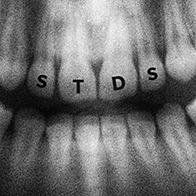Oral Chlamydia: The Invisible STI Hiding In Plain View

Inside your body is something called the epithelial lining—like an internal skin, it's a cell layer protecting your glands and organs. However, not all epithelial lining is buried in your innards.
Jab your tongue around your mouth or, if you're not in public and happen to have one, examine the skin inside your vagina. Both possess highly porous, sensitive skin, and as such, are especially susceptible to bacterial infections. For example, the skin on your arm or leg requires some kind of abrasion—even one invisible to the eye, a microdermabrasion—or irritation for bacteria to take hold. However, the lining of your mouth or intestinal tract doesn't need any erosion for bacteria to break through because it's already designed for the transfer of nutrients.
This is, in part, how something we consider a genitals-only problem can take residence in the mouth and throat: chlamydia.
Symptoms are vague, if present at all, and many people infected will not think to get tested and seek treatment.
"Oral chlamydia is contracted when the oral mucosa makes contact with another infected mucosa," said Laura Purdy, M.D., a telemedicine physician and Medical Director at Wisp. "This can be the genital, anal or oral mucosa of another person. It is perfectly reasonable to have an infection only in one part of the body and not another part of the body simultaneously. We see it quite often that a person has chlamydia of the oral cavity but not of the genitals, and vice versa."
The issue with oral chlamydia is, like its genital counterpart, it's easily overlooked: Symptoms are vague, if present at all, and many people infected will not think to get tested and seek treatment. Oral chlamydia in particular passes under the radar because of its semblance to the common cold.
Who can help?
There are some telltale clues to look for—namely, swollen lymph nodes and painless but persistent sores in the mouth that don't heal. Even these more unique symptoms are commonplace and misinterpreted: Swollen lymph nodes indicate the presence of a viral infection in general and, rarely, cancer, and painless sores are, by definition, painless and easier to ignore than a canker sore or another ulcer complicating eating and speech.
Just because this infection resides in the mouth, don't assume a clean bill of health from a dentist means you're in the clear.
"Dentists do have the ability to prescribe medications within their scope of practice, but not every dentist and not every state dental licensing board might consider oral chlamydia to be within their scope of practice," Purdy said. "Additionally, a dentist's office is less likely to do an oral swab for this."
Even if your dentist (or orthodontist) won't be handling your oral symptoms, Purdy points out that it's still important to disclose any infections to them. After all, they'll be seeing a wide variety of patients after you, and it's critical to do everything possible to reduce potential spread.
In the meantime, determining who is best suited for the task at hand can prove a challenge. The overlap of specialties between different practitioners is a contributing factor to oral chlamydia's invisibility: Whose job is it to check for it? Your dentist doesn't have STIs on the brain, and some healthcare providers may not be thinking of testing for infection in the mouth and throat. This is where open and honest communication with your primary care physician or OB-GYN is critical. If you have even the slightest suspicion you may have an infection of the mouth or throat, ask your doctor to check.
Always be testing
The silver lining in all of this is that all chlamydia is treatable with a regimen of very common antibiotic drugs, typically azithromycin and doxycycline. So while oral chlamydia can potentially lead to gum disease, tooth loss and mouth infections, it doesn't have to.
On that note, only two of the three doctors interviewed for this article agreed that oral chlamydia may even have dental side effects. The more general consensus is that dental symptoms are a result of a compromised immune system, not a direct consequence of chlamydia specifically.
Despair isn't the appropriate response to oral chlamydia's asymptomatic nature—caution is. If there's an obscure version of a common illness that already goes unnoticed, the answer is to get tested with every new partner even if you don't suspect a problem.
Self-advocacy in medical settings can be intimidating, but a gentle reminder never hurts anyone. It's always worth requesting an oral swab at your next routine STI test.




















